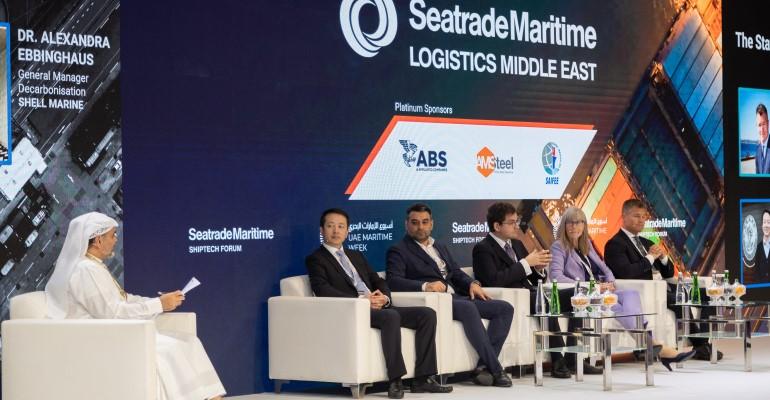Speaking at a session on alternative fuels and carbon pricing, Panos Koutsourakis, vice president, global sustainability at ABS, outlined his expected future pathway where fossil fuels continue to play a major role in the industry while fuel efficiency increases and new fuels are brought into play, led by LNG and methanol. A key theme of the session was regulation, both the need for it and the potential for regulation to change outcomes.
“If, as we’re expecting at MEPC 80 in July, we see a shift to a lifecycle analysis approach to fuels, a well-to-wake approach, the fuel roadmap will change,” said Koutsourakis. Adding emissions from the production and transportation of marine fuels brings many more factors into emissions considerations, rewriting the green credentials of a given fuel compared to its emissions under the more limited tank-to-wake model.
Dr. Domagoj Baresic, Research Associate at the UCL energy institute focused his contributions on the role of carbon pricing in the maritime sector and repeatedly stressed that regulation was fundamental for carbon pricing to have an impact, but the actual price can be decided in the future so long as a transparent framework is built.
“If we say at MEPC 80 that this is our decarbonisation ambition for 2050, we don't have to say the carbon price will be X amount by 2040,” said Baresic. But, by setting a level of ambition now, “we will set the price structure and go to that level as the technology develops over time. At least if the industry has an amount of certainty that this regulation is coming into force, it can start preparing."
Baresic said that in his given scenario the industry will still have stranded assets, but regulation will create a directed approach to investment, research and development in combination with a basket of other measures promoting decarbonisation. This will allow stakeholders to prepare. Once regulations and progress are clarified, the price level will come into play.
“One of the earliest lessons I learned when I came over to marine was that it doesn’t really matter how much I pay for the fuel. What matters more is how much my competitor pays – there needs to be a level playing field,” said Dr. Alexandra Ebbinghaus, General Manager Decarbonisation at Shell Marine.
Carbon pricing will help level the cost of fossil fuels and greener fuels, but when fuels are $900 per tonne more expensive and you need more of that fuel, a carbon price would put everyone out of the market, said Ebbinghaus.
“The carbon price is absolutely necessary, it just won’t completely close the gap,” said Ebbinghaus. “So yes, the regulatory framework is needed to actually drive the decision, and there are going to be a lot of question marks on which direction [we take].”
Session moderator Captain Mohamed al Ali, Senior Vice President, Offshore Logistics at ADNOC Logistics & Services, said the uncertainty around future fuels made it difficult to forecast normal vessel lifespans of 25 years, narrowing the focus to the next 15 years. “We look at 2040 as a target, but beyond that it is becoming even more challenging [to predict],” said Ali.
Ebbinghaus said the expected lifespan of a vessel varied by segment, but could impact investment decisions if cheaper vessels with shorter lifespans looked economically viable. Koutsourakis said that fuel-ready vessels designed with future fuels and technologies in mind could mitigate such problems by reducing the cost of retrofits, and modular construction could limit off-hire time in yards.
Innovations on long life vessels like LNG carriers such as using hydrogen as part of the fuel mix could add 10 or 15 years to a ship’s life under CII rules, said Koutsourakis. “So, we have to be aware of all the options, because vessels are very expensive assets, and the owners or the managers making the investment, they want to make returns. It is still a commercial business.”
Copyright © 2024. All rights reserved. Seatrade, a trading name of Informa Markets (UK) Limited.
Add Seatrade Maritime News to your Google News feed.  |


